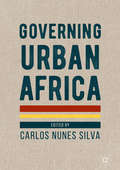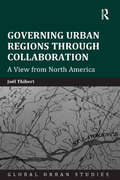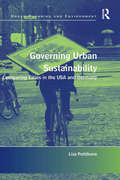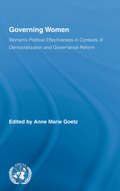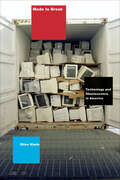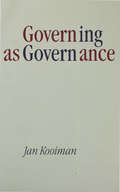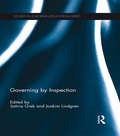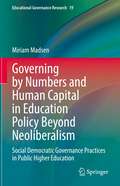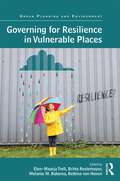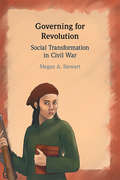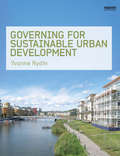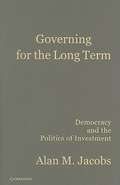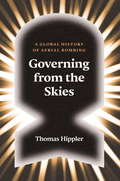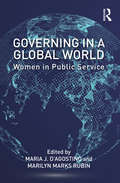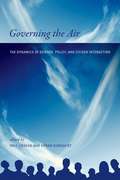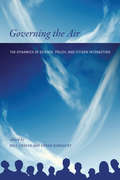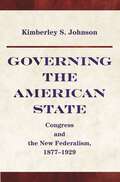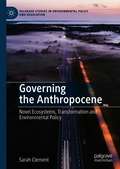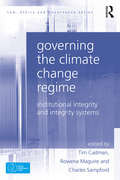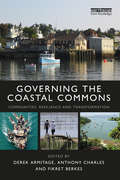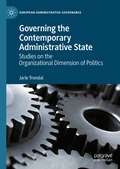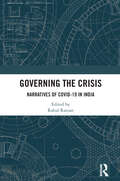- Table View
- List View
Governing Urban Africa
by Carlos Nunes SilvaThis book explores some of the key challenges confronting the governance of cities in Africa, the reforms implemented in the field of urban governance, and the innovative approaches in critical areas of local governance, namely in the broad field of decentralization and urban planning reform, citizen participation, and good governance. The collection also investigates the constraints that continuously hamper urban governments as well as the ability to improve urban governance in African cities through citizen responsive innovations. Decentralization based on the principle of subsidiarity emerges as a critical necessary reform if African cities are to be appropriately empowered to face the challenges created by the unprecedented urban growth rate experienced all over the continent. This requires, among other initiatives, the implementation of an effective local self-government system, the reform of planning laws, including the adoption of new planning models, the development of citizen participation in local affairs, and new approaches to urban informality. The book will be of interest to students, researchers and policy makers in urban studies, and in particular for those interested in urban planning in Africa.
Governing Urban Economies
by Neil Bradford Allison BramwellToday more than ever, cities matter to the economic and social well-being of the vast majority of Canadians. Canada's urban centers are simultaneously the engines of the national economy and the places where the risks of social exclusion are most concentrated, making innovative and inclusive urban governance an urgent national priority.Governing Urban Economies is the first detailed scholarly examination of relations among governmental and community-based actors in Canadian city-regions. Comparing patterns of municipal-community relations and federal-provincial interactions across city-regions, this volume tracks the ways in which urban coalitions tackle complex economic and social challenges. Featuring an inter-disciplinary group of established and up-and-coming scholars, this collection breaks new ground in the Canadian urban politics literature and will appeal to urbanists working in a range of national contexts.
Governing Urban Regions Through Collaboration: A View from North America (Global Urban Studies)
by Joël ThibertWith the demise of the Old Regionalist project of achieving good regional governance through amalgamation, voluntary collaboration has become the modus operandi of a large number of North American metropolitan regions. Although many researchers have become interested in regional collaboration and its determinants, few have specifically studied its outcomes. This book contributes to filling this gap by critically re-evaluating the fundamental premise of the New Regionalism, which is that regional problems can be solved without regional/higher government. In particular, this research asks: to what extent does regional collaboration have a significant independent influence on the determinants of regional resilience? Using a comparative (Canada-U.S.) mixed-method approach, with detailed case studies of the San Francisco Bay Area, the Greater Montreal and trans-national Niagara-Buffalo regions, the book examines the direct and indirect impacts of inter-local collaboration on policy and policy outcomes at the regional and State/Provincial levels. The book research concentrates on the effects of bottom-up, state-mandated and functional collaboration and the moderating role of regional awareness, higher governmental initiative and civic capital on three outcomes: environmental preservation, socio-economic integration and economic competitiveness. In short, the book seeks to highlight those conditions that favor collaboration and might help avoid the collaborative trap of collaboration for its own sake. More specifically, this research concentrates on the effect of bottom-up, state-mandated and functional collaboration, the moderating role of regional awareness, governmental initiative and civic capital on environmental preservation, socio-economic integration and economic competitiveness. In short, the book seeks to understand whether and how urban regional collaboration contributes to regional resilience.
Governing Urban Sustainability: Comparing Cities in the USA and Germany
by Lisa PettiboneIn her study of the interactions between tools of urban sustainability governance in key cities, Lisa Pettibone argues that a new factor-sustainability-minded groups-may be critical to building momentum for sustainability. The book presents in-depth case studies of six cities in the USA and Germany: New York, Portland, Seattle, Berlin, Hamburg, and Heidelburg. Drawing on 75 interviews, document analysis, and a bilingual literature review, the book analyzes how sustainability is politically constructed in city strategic plans and sustainability indicators. The volume provides a comprehensive introduction to the principles of sustainability, discusses the key governance instruments relevant to urban sustainability, and delivers new empirical and theoretical material on their role in a sustainability transition. It concludes that despite the national-level differences, cities’ experiences in both countries are similar. Political sustainability at the city level differs in several important ways from academic principles of sustainability. Finally, it proposes that sustainability-minded groups may be a key link to connect urban sustainability in practice to theoretical concepts.
Governing Women: Women’s Political Effectiveness in Contexts of Democratization and Governance Reform (Routledge/UNRISD Research in Gender and Development)
by Anne Marie GoetzThough the proportion of women in national assemblies still barely scrapes 16% on average, the striking outliers - Rwanda with 49% of its assembly female, Argentina with 35%, Liberia and Chile with new women presidents this year - have raised expectations that there is an upward trend in women's representation from which we may expect big changes in the quality of governance. But getting women into public office is just the first step in the challenge of creating governance and accountability systems that respond to women's needs and protect their rights. Using case studies from around the world, the essays in this volume consider the conditions for effective connections between women in civil society and women in politics, for the evolution of political party platforms responsive to women's interests, for local government arrangements that enable women to engage effectively, and for accountability mechanisms that answer to women. The book's argument is that good governance from a gender perspective requires more than more women in politics. It requires fundamental incentive changes to orient public action and policy to support gender equality.
Governing and Ruling: The Political Logic of Taxation in China (China Understandings Today)
by Changdong ZhangRapid social economic changes, the transition from a planned economy to a market economy, or even economic liberalization can lead to political instability and the collapse of authoritarian regimes. Despite experiencing all of these unprecedented changes in the past forty years, China under the Chinese Communist Party’s leadership has so far successfully transformed and improved both its governance capacity and its ruling capacity. Governing and Ruling addresses this regime resilience puzzle by examining the political logic of its taxation system, especially the ways in which taxation helps China handle three governance problems: maneuvering social control, improving agent discipline, and eliciting cooperation. Changdong Zhang argues that a taxation system plays an important role in sustaining authoritarian rule, in China and elsewhere, by combining co-optation and repression functions. The book collects valuable firsthand and secondhand data; studies China’s taxation system, intergovernmental fiscal relationships, composition of fiscal revenue sources, and tax administration; and discusses how each dimension influences the three governance problems.
Governing as Governance
by Jan KooimanThe concept of `governance' has become a central catchword across the social and political sciences. In Governing and Governance, Jan Kooiman revisits and develops his seminal work in the field to map and demonstrate the utility of a sociopolitical perspective to our understanding of contemporary forms of governing, governance and governability. A central underlying theme of the book is the notion of governance as a process of interaction between different societal and political actors and the growing interdependencies between the two as modern societies become ever more complex, dynamic and diverse. Drawing upon a wide range of interdisciplinary insights, the book advances a comprehensive conceptual framework that seeks to capture the different elements, modes and orders of governing and governance. A series of useful distinctions are employed, for example, between self, `co', and hierarchical modes, and between first, second, or meta orders to illustrate the many different structures and levels of modern governance today. Theoretically rich and illuminating, Governing and Governance will be essential reading for all students and academics across the social and political sciences, public management and public administration.
Governing by Inspection (Studies in European Education)
by Sotiria Grek Joakim LindgrenIn recent decades, governing practices in education have become highly contradictory: deregulation and decentralisation are accompanied by re-regulation and increased centralisation, contributing to considerable governing tensions in and across different national systems and within the emergent European education policy space. On the one hand there is the persistence of performance monitoring through target-setting, indicators and benchmarks, and on the other, the promotion of self-evaluation and ‘light touch’ regulation that express a ‘softer’ governance turn, and promote self-regulation as the best basis for constant improvement. Drawing on research undertaken into three national systems, this edited volume explores the attempts to manage these tensions in Europe through the development of inspection as a governing practice. Inspectorates and inspectors offer key locations for the exploration of governing tensions, positioned as they are between the international, the national, and the local and institutional, and with responsibility for both regulation and development. All three national systems offer contrasting approaches to inspection, all of which have changed considerably in recent years. Governing by Inspection positions inspection in the framework of changing education policy and politics, and in a period of intensive policy development and exchange in Europe. It will be key reading for academics, researchers and postgraduate students in the fields of education, political science and social policy.
Governing by Numbers and Human Capital in Education Policy Beyond Neoliberalism: Social Democratic Governance Practices in Public Higher Education (Educational Governance Research #19)
by Miriam MadsenThis book addresses governing by numbers and human capital policy in higher education by asking how higher education is quantified, how the quantitative information is used in educational governance, and how the information is perceived by students, teachers, managers, and policymakers, and affects decision-making. It also thematically discusses how human capital theory affects the quantification practices and, thereby, their effects. Based on these analyses, the book asks whether governing by numbers and human capital in education policy are necessarily neoliberal practices, and thus questions the theory of global convergence in educational governance.The book provides a thorough analysis of the quantification of graduate outcomes based on the philosophical framework of Agential Realism, thus offering a novel analytical approach to the study of data and indicators in educational governance. The book draws on a comprehensive ethnographic case study from Danish higher education, and relates the findings from this case study to empirical cases in other countries and international research in the field. The book brings together literature from various fields, including political science, accounting, education, and sociology of quantification, in order to provide a comprehensive account of how quantification practices affect education.
Governing for Resilience in Vulnerable Places (Urban Planning and Environment)
by Bettina Van Hoven Elen-Maarja Trell Britta Restemeyer Melanie M. BakemaGoverning for Resilience in Vulnerable Places provides an overview and a critical analysis of the ways in which the concept ‘resilience’ has been addressed in social sciences research. In doing so, this edited book draws together state-of-the-art research from a variety of disciplines (i.e. spatial planning, economic and cultural geography, environmental and political sciences, sociology and architecture) as well as cases and examples across different spatial and geographical contexts (e.g. urban slums in India; flood-prone communities in the UK; coastal Japan). The cases present and explore challenges and potentials of resilience-thinking for practitioners and academics. As such, Governing for Resilience in Vulnerable Places aims to provide a scientifically robust overview and to generate some conceptual clarity for researchers, students and practitioners interested in the potential of resilience thinking as well as the application of resilience in practice.
Governing for Revolution: Social Transformation in Civil War
by Megan A. StewartPrevailing views suggest rebels govern to enhance their organizational capacity, but this book demonstrates that some rebels undertake costly governance projects that can imperil their cadres during war. The origins for this choice began with the Chinese Communist Party (CCP) during the Chinese Civil War. The CCP knowingly introduced challenging governance projects, but nevertheless propagated its strategy globally, creating a behavioural model readily available to later rebels. The likelihood of whether later rebels' will imitate this model is determined by the compatibility between their goals and the CCP's objectives; only rebels that share the CCP's revolutionary goals decide to mimic the CCP's governance fully. Over time, ideational and material pressures further encouraged (and occasionally rewarded) revolutionary rebels' conformity to the CCP's template. Using archival data from six countries, primary rebel sources, fieldwork and quantitative analysis, Governing for Revolution underscores the mimicry of and ultimate convergence in revolutionary rebels' governance, that persists even today, despite vast differences in ideology.
Governing for Sustainable Urban Development
by Yvonne RydinAchieving urban sustainability is amongst the most pressing issues facing planners and governments. This book is the first to provide a cohesive analysis of sustainable urban development and to examine the processes by which change in how urban areas are built can be achieved. The author looks at how sustainable urban development can be delivered on the ground through a comprehensive analysis of the different modes of governing for new urban development. Governing for Sustainable Urban Development: considers a range of policy tools that influence urban development and that constitute different modes of governing provides an innovative conceptual emphasis on learning within governing processes draws on a wide range of existing research, policy and literature together with case study material focussing on London is above all concerned with demonstrating how sustainable urban development can be delivered in practice. This title be essential reading for students, academics and professionals in planning, urban design and architecture world-wide working to achieve sustainability.
Governing for the Long Term
by Alan M. JacobsIn Governing for the Long Term, Alan M. Jacobs investigates the conditions under which elected governments invest in long-term social benefits at short-term social cost. Jacobs contends that, along the path to adoption, investment-oriented policies must surmount three distinct hurdles to future-oriented state action: a problem of electoral risk, rooted in the scarcity of voter attention; a problem of prediction, deriving from the complexity of long-term policy effects; and a problem of institutional capacity, arising from interest groups' preferences for distributive gains over intertemporal bargains. Testing this argument through a four-country historical analysis of pension policymaking, the book illuminates crucial differences between the causal logics of distributive and intertemporal politics and makes a case for bringing trade-offs over time to the center of the study of policymaking.
Governing from the Skies: A Global History of Aerial Bombing
by Thomas HipplerThe history of the war from the past one hundred years is a history of bombingEver since its invention, aviation has embodied the dream of perpetual peace between nations, yet the other side of this is the nightmare of an unprecedented deadly power. A power initially deployed on populations that the colonizers deemed too restive, it was then used to strike the cities of Europe and Japan during World War II.With air war it is now the people who are directly taken as target, the people as support for the war effort, and the sovereign people identified with the state. This amounts to a democratisation of war, and so blurs the distinction between war and peace.This is the political shift that has led us today to a world governance under United States hegemony defined as 'perpetual low-intensity war', which is presently striking regions such as Yemen and Pakistan, but which tomorrow could spread to the whole world population.Air war thus brings together the major themes of the past century: the nationalization of societies and war, democracy and totalitarianism, colonialism and decolonization, Third World-ism and globalization, and the welfare state and its decline in the face of neoliberalism. The history of aerial bombing offers a privileged perspective for writing a global history of the twentieth century.From the Hardcover edition.
Governing in a Global World: Women in Public Service
by Marilyn Marks Rubin Maria J. D’AgostinoGoverning in a Global World captures the panorama of women governing around the world. Even though the modern era marks history’s greatest advancements for women, worldwide they hold fewer than 30 percent of decision-making positions and are often missing from negotiating tables where policies are made and conflicts resolved. The opening chapters present trends and context for studying women in public service by focusing on path-setters across the globe, the status of women in the world’s executive and legislative bodies, and their participation in public service across several nations. Later chapters examine power, leadership and representation of women in public service, with several chapters looking at women governing from a regional perspective in the Middle East, Sub Sahara Africa, Latin America, and China. The final chapter presents empirical evidence that shows how policies to increase women’s representation in the public arena reduce gender inequality more than any other policy intervention. Taken together, the chapters illustrate the worldwide importance of, and challenges to, promoting gender equality and women governing.
Governing in a Polarized Age
by Eric Schickler Gerber Alan S.Many political observers have expressed doubts as to whether America's leaders are up to the task of addressing major policy challenges. Yet much of the critical commentary lacks grounding in the systematic analysis of the core institutions of the American political system including elections, representation, and the law-making process. Governing in a Polarized Age brings together more than a dozen leading scholars to provide an in-depth examination of representation and legislative performance. Drawing upon the seminal work of David Mayhew as a point of departure, these essays explore the dynamics of incumbency advantage in today's polarized Congress, asking whether the focus on individual re-election that was the hallmark of Mayhew's ground-breaking book, Congress: The Electoral Connection, remains useful for understanding today's Congress. The essays link the study of elections with close analysis of changes in party organization and with a series of systematic assessments of the quality of legislative performance.
Governing the Air
by Rolf Lidskog Goran SundqvistGoverning the Air looks at the regulation of air pollution not as a static procedure of enactment and agreement but as a dynamic process that reflects the shifting interrelationships of science, policy, and citizens. Taking transboundary air pollution in Europe as its empirical focus, the book not only assesses the particular regulation strategies that have evolved to govern European air, but also offers theoretical insights into dynamics of social order, political negotiation, and scientific practices. These dynamics are of pivotal concern today, in light of emerging international governance problems related to climate change. The contributors, all prominent social scientists specializing in international environmental governance, review earlier findings, analyze the current situation, and discuss future directions for both empirical and theoretical work. [cut last sentence in first para for catalog] The chapters discuss the institutional dimensions of international efforts to combat air pollution, examining the effectiveness of CLRTAP (Convention for Long-Range Transboundary Air Pollution) and the political complexity of the European Union; offer a broad overview and detailed case studies of the roles of science, expertise, and learning; and examine the "missing link" in air pollution policies: citizen involvement. Changing political conditions, evolving scientific knowledge, and the need for citizen engagement offer significant challenges for air pollution policy making. By focusing on process rather than product, learning rather than knowledge, and strategies rather than interests, this book gives a nuanced view of how air pollution is made governable.
Governing the Air: The Dynamics of Science, Policy, and Citizen Interaction (Politics, Science, and the Environment)
by Rolf Lidskog Goran SundqvistExperts offer theoretical and empirical analyses that view the regulation of transboundary air pollution as a dynamic process.Governing the Air looks at the regulation of air pollution not as a static procedure of enactment and agreement but as a dynamic process that reflects the shifting interrelationships of science, policy, and citizens. Taking transboundary air pollution in Europe as its empirical focus, the book not only assesses the particular regulation strategies that have evolved to govern European air, but also offers theoretical insights into dynamics of social order, political negotiation, and scientific practices. These dynamics are of pivotal concern today, in light of emerging international governance problems related to climate change. The contributors, all prominent social scientists specializing in international environmental governance, review earlier findings, analyze the current situation, and discuss future directions for both empirical and theoretical work.The chapters discuss the institutional dimensions of international efforts to combat air pollution, examining the effectiveness of CLRTAP (Convention for Long-Range Transboundary Air Pollution) and the political complexity of the European Union; offer a broad overview and detailed case studies of the roles of science, expertise, and learning; and examine the “missing link” in air pollution policies: citizen involvement.Changing political conditions, evolving scientific knowledge, and the need for citizen engagement offer significant challenges for air pollution policy making. By focusing on process rather than product, learning rather than knowledge, and strategies rather than interests, this book gives a nuanced view of how air pollution is made governable.
Governing the American State: Congress and the New Federalism, 1877-1929 (Princeton Studies in American Politics: Historical, International, and Comparative Perspectives #91)
by Kimberley S. JohnsonThe modern, centralized American state was supposedly born in the Great Depression of the 1930s. Kimberley S. Johnson argues that this conventional wisdom is wrong. Cooperative federalism was not born in a Big Bang, but instead emerged out of power struggles within the nation's major political institutions during the late nineteenth and early twentieth centuries. Examining the fifty-two years from the end of Reconstruction to the beginning of the Great Depression, Johnson shows that the "first New Federalism" was created during this era from dozens of policy initiatives enacted by a modernizing Congress. The expansion of national power took the shape of policy instruments that reflected the constraints imposed by the national courts and the Constitution, but that also satisfied emergent policy coalitions of interest groups, local actors, bureaucrats, and members of Congress. Thus, argues Johnson, the New Deal was not a decisive break with the past, but rather a superstructure built on a foundation that emerged during the Gilded Age and the Progressive Era. Her evidence draws on an analysis of 131 national programs enacted between 1877 and 1930, a statistical analysis of these programs, and detailed case studies of three of them: the Federal Highway Act of 1916, the Food and Drug Act of 1906, and the Sheppard-Towner Act of 1921. As this book shows, federalism has played a vital but often underappreciated role in shaping the modern American state.
Governing the Anthropocene: Novel Ecosystems, Transformation and Environmental Policy (Palgrave Studies in Environmental Policy and Regulation)
by Sarah ClementThis book focuses on the present and future challenges of managing ecosystem transformation on a planet where human impacts are pervasive. In this new epoch, the Anthropocene, the already rapid rate of species loss is amplified by climate change and other stress factors, causing transformation of highly-valued landscapes. Many locations are already transforming into novel ecosystems, where new species, interactions, and ecological functions are creating landscapes unlike anything seen before. This has sparked contentious debate not just about science, but about decision-making, responsibility, fairness, and human capacity to intervene. Clement argues that the social and ecological reality of the Anthropocene requires modernised governance and policy to confront these new challenges and achieve ecological objectives. There is a real opportunity to enable society to cope with transformed ecosystems by changing governance, but this is notoriously difficult. Aimed at anyone involved in these conversations, be those researchers, practitioners, decision makers or students, this book brings together diffuse research exploring how to confront institutional change and ecological transformation in different contexts, and provides insight into how to translate governance concepts into productive pathways forward.
Governing the Climate
by Johannes Stripple Harriet BulkeleyDespite a growing interest in critical social and political studies of climate change, the field remains fragmented and diffuse. This is the first volume to collect this body of scholarship, providing a key reference point in the growing debate about climate change across the social sciences. The book provides a new set of insights into the ways in which climate change is creating new forms of social order, and the ways in which they are structured through the workings of rationality, power and politics. Governing the Climate is invaluable for three main audiences: social science researchers and advanced students in the field of climate change; the wider research community interested in global environmental politics and global environmental governance; and policy makers and researchers concerned more broadly with environmental politics at international, national and local levels.
Governing the Climate Change Regime: Institutional Integrity and Integrity Systems (Law, Ethics and Governance)
by Tim Cadman Rowena Maguire Charles SampfordThis volume, the second in a series of three, examines the institutional architecture underpinning the global climate integrity system. This system comprises an inter-related set of institutions, governance arrangements, regulations, norms and practices that aim to implement the United Nations Framework Convention on Climate Change (UNFCCC). Arguing that governance is a neutral term to describe the structures and processes that coordinate climate action, the book presents a continuum of governance values from ‘thick’ to ‘thin’ to determine the regime’s legitimacy and integrity. The collection contains four parts with part one exploring the links between governance and integrity, part two containing chapters which evaluate climate governance arrangements, part three exploring avenues for improving climate governance and part four reflecting on the road to the UNFCCC's Paris Agreement. The book provides new insights into understanding how systemic institutional and governance failures have occurred, how they could occur again in the same or different form and how these failures impact on the integrity of the UNFCCC. This work extends contemporary governance scholarship to explore the extent to which selected institutional case studies, thematic areas and policy approaches contribute to the overall integrity of the regime.
Governing the Coastal Commons: Communities, Resilience and Transformation (Earthscan Oceans)
by Anthony Charles Fikret Berkes Derek ArmitageCoastal communities depend on the marine environment for their livelihoods, but the common property nature of marine resources poses major challenges for the governance of such resources. Through detailed cases and consideration of broader global trends, this volume examines how coastal communities are adapting to environmental change, and the attributes of governance that foster deliberate transformations and help to build resilience of social and ecological systems. Governance here reflects how communities, societies and organisations (e.g. fisher cooperatives, government agencies) choose to organise themselves to make decisions about important issues, such as the use and protection of coastal commons (e.g. fishery resources). The book shows how a governance approach generates insights into the specific forms and arrangements that enable coastal communities to steer away from unsustainable pathways. It also provides an analytical lens to consider important questions of power, knowledge and legitimacy in linked social-ecological systems. Chapters highlight examples in which communities are engaging in deliberative transformations to build resilience and enhance their well-being. These transformations and efforts to build resilience are emerging through multi-level collaboration, shared learning, innovative policies and institutional arrangements (such as new property rights regimes and co-management), methodologies that engage with indigenous cultural practices, and entrepreneurial activities, including income and livelihood diversification. Case studies are included from a range of countries including Canada, Japan, Brazil, Indonesia, Mexico, South Africa, Thailand, the South Pacific and Europe. The authors integrate theory with practical examples to improve coastal marine policy and governance, and draw upon emerging concepts from social-ecological resilience and transformations, adaptive governance and the scholarship on the commons.
Governing the Contemporary Administrative State: Studies on the Organizational Dimension of Politics (European Administrative Governance)
by Jarle TrondalThis book examines the transformation of the administrative state, since it was first coined by Dwight Waldo seventy years ago. Empirically, the book assesses how the administrative state is facing endogenous reforms through administrative devolution, as well as exogenous shifts by the rise of multilevel administrative systems and international bureaucracy. Facing dual shifts, the book offers a comprehensive analysis of how the administrative state handles three interconnected challenges: first, a need for innovation and reform, as well as stability and robustness; second, administrative autonomy among regulatory bodies, as well as political leadership and democratic accountability; and third, nation-state sovereignty and international collaboration. It also highlights the robust character of the administrative state by demonstrating profound stability in public governance even during times of profound turbulence. It will appeal to scholars and students of public policy, public administration and global governance, as well as practitioners interested in new developments in public governance.
Governing the Crisis: Narratives of Covid-19 in India
by Rahul RanjanThis book presents a multidimensional approach to understanding the effects of COVID-19 on the lifeworld of the marginalised communities in India. The essays in the volume pursue two interrelated concerns: First, they examine the governance aspect, highlighting institutional failures, a lack of political will, and ideological warfare; second, they firmly position the crisis – as a narrative tool – at the heart of marginality, thereby explaining the effects of COVID-19 on communities that continue to remain at the nation's margins. The volume presents varied voices and granular narratives of sufferings that structured the lives of the poorest and dispossessed in the country during the crisis. It dovetails the reshaping of material forces that were crucially impacted by the failure of governance with the social lifeworld of those containing what can be referred to as intergenerational trauma. This volume offers a robust account of the crisis by combining these two distinct but complementary dimensions of COVID-19 in India.The volume will greatly interest scholars and researchers in crisis studies, governance, medical anthropology, public policy, politics, sociology, and South Asian studies.
